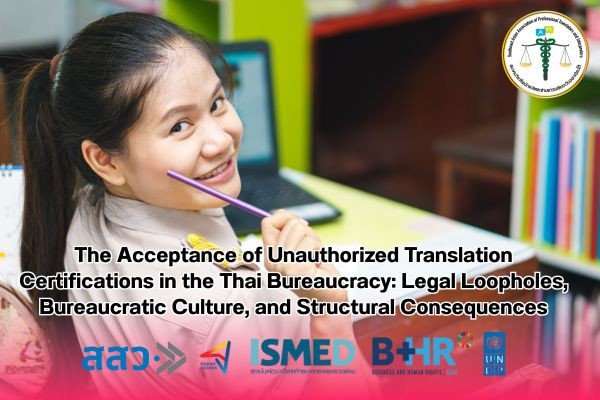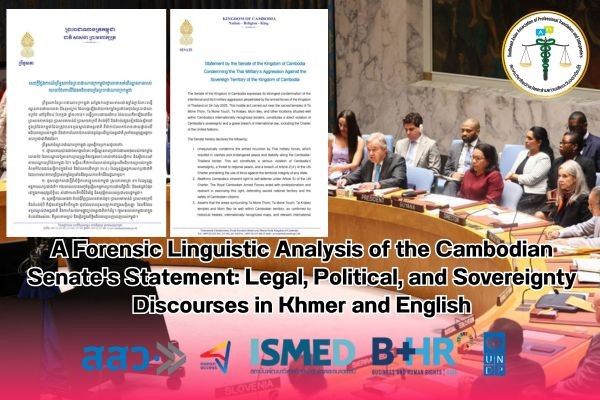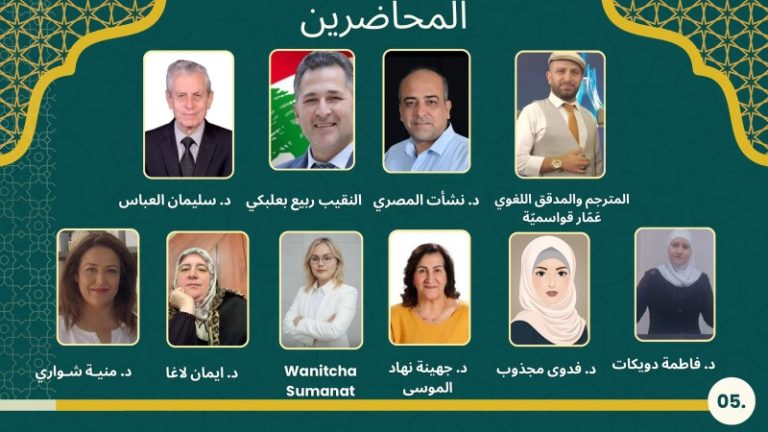The Acceptance of Unauthorized Translation Certifications in the Thai Bureaucracy:
Legal Loopholes, Bureaucratic Culture, and Structural Consequences
Author: Wanitcha Sumanat, president of the Southeast Asian Association of Professional Translators and Interpreters
Introduction
Certified translations play an essential role in legal and administrative processes, particularly in cross-border transactions. Official documents submitted to Thai authorities must be accurate and certified by authorized professionals to ensure legal reliability. However, in practice, Thailand has allowed “Notarial Services Attorneys” to certify translations even though they lack the legal authority to verify the accuracy of translated content. Their mandate is limited to certifying signatures or the authenticity of documents, not translations. The acceptance of such documents by Thai bureaucratic agencies not only violates legal requirements but also creates serious risks to the integrity of Thailand’s legal and economic order.
Legal Framework
Lawyers Act B.E. 2528 (1985)
The Lawyers Act defines the scope of authority for Thai attorneys but does not authorize them to certify translations. The Notarial Services Attorney designation permits only the authentication of signatures and the verification of document appearance, not certification of translated content (Lawyers Act, 1985, Sections 5–7).
Administrative Procedure Act B.E. 2539 (1996)
The Act requires that documents used in administrative procedures be accurate and verifiable (Sections 35–36). Improperly certified documents may result in administrative acts being void or invalid, thereby affecting the rights of parties involved (Administrative Procedure Act, 1996).
Constitution of the Kingdom of Thailand B.E. 2560 (2017)
The Constitution establishes the principle of the rule of law and mandates that state authorities act strictly in accordance with legal provisions (Section 3). Acceptance of unauthorized certifications by state officials runs contrary to this constitutional principle.
Problem Analysis
Legal Loopholes
Unlike many jurisdictions, Thailand lacks a formal Notary Public system. Instead, the Notarial Services Attorney framework has created confusion. Bureaucratic agencies often misinterpret attorneys’ authority to verify signatures as extending to certifying translations. This legal ambiguity is further compounded by administrative convenience and discretionary interpretation.
Bureaucratic Culture and the “Pass-Through” Mentality
Thai bureaucratic culture emphasizes compromise and expediency. Officials frequently operate under the mindset that “if there is no complaint or evident harm, the document can be accepted.” This approach reflects a culture of administrative leniency and avoidance of responsibility, reducing translation certification to a perfunctory bureaucratic task rather than a legal safeguard.
Structural Consequences for Business and Security
By accepting unauthorized certifications, bureaucracies inadvertently provide entry points for grey businesses, particularly Chinese grey capital groups, to establish companies, acquire permits, and conduct financial operations in Thailand. This fosters money laundering, illicit trade, and other unlawful activities that threaten both Thailand’s economic stability and its international credibility.
Policy Recommendations
- Enact a Certified Translators Act to clearly define the authority and responsibility of professional translators in certifying translations.
- Develop a professional licensing and regulatory body such as SEAProTI to oversee certification and enforce accountability.
- Impose legal liability on officials who knowingly accept unauthorized certifications to reduce negligence.
- Provide training for bureaucrats to distinguish between signature authentication and translation certification.
- Harmonize with international standards, such as Europe’s sworn translator system, to ensure credibility and attract legitimate foreign investment.
The bureaucratic acceptance of unauthorized translation certifications in Thailand constitutes a violation of statutory law and the rule of law principle. More importantly, it exposes Thailand to systemic risks, allowing grey businesses to exploit regulatory gaps for economic and legal advantage. This issue is not a technical irregularity but a structural weakness rooted in selective enforcement and bureaucratic negligence. Comprehensive reforms in both legal frameworks and bureaucratic culture are necessary if Thailand is to safeguard its national interests and maintain international credibility.
References
- Lawyers Act, B.E. 2528 (1985). Royal Thai Government Gazette.
- Administrative Procedure Act, B.E. 2539 (1996). Royal Thai Government Gazette.
- Constitution of the Kingdom of Thailand, B.E. 2560 (2017). Royal Thai Government Gazette.
- SEAProTI. (2024). Professional Standards and Ethics for Legal Translators and Interpreters in Thailand. Bangkok: SEAProTI Press.
- Fairclough, N. (1995). Critical Discourse Analysis: The Critical Study of Language. London: Longman.
- Van Dijk, T. A. (1998). Ideology: A Multidisciplinary Approach. London: Sage.
The Southeast Asian Association of Professional Translators and Interpreters (SEAProTI) has announced the criteria and qualifications for registration of Certified Translators, Translation Certification Providers, and Certified Interpreters of the Association. These criteria were published under Sections 9 and 10 of the Royal Thai Government Gazette, Secretariat of the Cabinet, Office of the Prime Minister, on 25 July 2024, Vol. 141, Part 66 Ng, p. 100. Full text available here: The Royal Thai Government Gazette
** The Office of the Council of State has proposed issuing a Royal Decree stipulating that registered translators—including certification providers from professional associations or accredited language training institutions—be legally empowered to certify translations (Letter to SEAProTI dated 28 April 2025).
*** SEAProTI is the first professional association in Thailand and Southeast Asia to establish a formal certification system for Certified Translators, Translation Certification Providers, and Certified Interpreters.
Headquarters:
33 Baan Rajakhru Building, Room 402, Soi Phahonyothin 5, Phahonyothin Road, Phayathai Sub-district, Phayathai District, Bangkok 10400, Thailand
Email: hello@seaproti.com
Phone: (+66) 2-114-3128 (Office Hours: Monday–Friday, 09:00–17:00)
การยอมรับการรับรองการแปลโดยทนายความที่ไม่มีสิทธิในระบบราชการไทย: ปัญหากฎหมาย วัฒนธรรมราชการ และผลกระทบเชิงโครงสร้าง
ผู้แต่ง วณิชชา สุมานัส นายกสมาคมวิชาชีพนักแปลและล่ามแห่งเอเชียตะวันออกเฉียงใต้
24 สิงหาคม 2568, กรุงเทพมหานคร – บทความนี้มุ่งวิเคราะห์ปัญหาที่ระบบราชการไทยยอมรับงานแปลที่รับรองโดยทนายความที่ไม่มีสิทธิตามกฎหมายในการรับรองการแปล โดยอ้างว่า “หากไม่มีผู้ทักท้วงหรือไม่ก่อให้เกิดความเสียหายก็สามารถใช้ได้” พฤติกรรมดังกล่าวไม่เพียงเป็นการละเมิดหลักนิติรัฐ (rule of law) แต่ยังเปิดช่องให้ธุรกิจต่างชาติ โดยเฉพาะธุรกิจเทา เช่น กลุ่มทุนจีนเทา เข้ามาตั้งธุรกิจในประเทศไทยได้โดยง่าย ผ่านช่องทางการใช้เอกสารแปลที่ผิดมาตรฐานทางกฎหมาย การศึกษานี้อธิบายปัญหาในสามมิติ ได้แก่ (1) ช่องว่างทางกฎหมาย, (2) วัฒนธรรมองค์กรราชการ, และ (3) ผลกระทบเชิงโครงสร้างต่อความมั่นคงทางเศรษฐกิจและกฎหมาย พร้อมทั้งเสนอข้อเสนอแนะเชิงนโยบายเพื่อยกระดับมาตรฐานการรับรองงานแปลในประเทศไทย
บทนำ
การรับรองการแปลเอกสารเป็นกลไกสำคัญในกระบวนการทางกฎหมายและธุรกรรมระหว่างประเทศ เอกสารราชการที่แปลต้องมีความถูกต้องและได้รับการรับรองจากผู้มีอำนาจตามกฎหมาย เพื่อสร้างความเชื่อมั่นให้กับทั้งภาครัฐและเอกชน อย่างไรก็ตาม ในประเทศไทยกลับพบว่ามีการนำเอกสารที่ “ทนายความผู้ทำคำรับรองลายมือชื่อและเอกสาร” (Notarial Services Attorney) ลงนามรับรองมาใช้เป็น “การรับรองการแปล” ทั้งที่ทนายความเหล่านี้ไม่มีอำนาจตามกฎหมายในการรับรองเนื้อหาของการแปล การยอมรับเช่นนี้ของระบบราชการไม่เพียงแต่ละเมิดข้อกฎหมาย แต่ยังทำให้ประเทศไทยเผชิญความเสี่ยงด้านความมั่นคงทางเศรษฐกิจและสังคม
กรอบกฎหมายที่เกี่ยวข้อง
พระราชบัญญัติทนายความ พ.ศ. 2528
พระราชบัญญัติทนายความกำหนดอำนาจและหน้าที่ของทนายความ แต่ ไม่มีบทบัญญัติใดให้อำนาจทนายความในการรับรองความถูกต้องของการแปลเอกสาร มีเพียงการทำคำรับรองลายมือชื่อและเอกสาร (Notarial Services Attorney) ซึ่งเป็นการรับรองในเชิง “การยืนยันลายมือชื่อและการปรากฏตัว” ไม่ใช่การรับรองสาระเนื้อหาของเอกสาร (พระราชบัญญัติทนายความ, 2528, มาตรา 5–7)
กฎหมายที่เกี่ยวกับการใช้เอกสารราชการ
พระราชบัญญัติวิธีปฏิบัติราชการทางปกครอง พ.ศ. 2539 กำหนดให้เอกสารที่ใช้ในกระบวนการราชการต้องมีความถูกต้องและสามารถตรวจสอบได้ (มาตรา 35–36) การใช้เอกสารที่รับรองไม่ถูกต้อง อาจก่อให้เกิดผลเป็นโมฆะและกระทบสิทธิของคู่กรณี (พุทธศักราช 2539)
หลักนิติรัฐและการบังคับใช้กฎหมาย
รัฐธรรมนูญแห่งราชอาณาจักรไทย พ.ศ. 2560 กำหนดหลักการพื้นฐานของ หลักนิติรัฐ (rule of law) โดยหน่วยงานรัฐต้องปฏิบัติตามกฎหมายอย่างเคร่งครัด (มาตรา 3) แต่การยอมรับการรับรองการแปลที่ไม่มีมูลทางกฎหมายเป็นการกระทำที่สวนทางกับหลักการนี้
การวิเคราะห์ปัญหา
ช่องว่างทางกฎหมาย
การที่กฎหมายไทยไม่มีกลไกการแต่งตั้ง Notary Public อย่างเป็นระบบ ทำให้เกิดช่องว่าง และถูกแทนที่ด้วย Notarial Services Attorney โดยสภาทนายความ ซึ่งนำไปสู่การตีความผิดว่า การเซ็นรับรองลายมือชื่อสามารถใช้แทนการรับรองการแปลได้ ความสับสนนี้ถูกซ้ำเติมด้วยการที่หน่วยงานรัฐหลายแห่งเลือกตีความแบบ “กว้าง” เพื่อความสะดวก
วัฒนธรรมราชการและการ “ปล่อยผ่าน”
ระบบราชการไทยมีลักษณะของ “วัฒนธรรมการประนีประนอม” (compromise culture) เจ้าหน้าที่บางรายมีทัศนคติว่า “หากไม่มีความเสียหายหรือไม่มีผู้ร้องเรียน ก็สามารถใช้ได้” ซึ่งเป็นการละเลยหลักความถูกต้องทางกฎหมาย และสะท้อนการทำงานเชิง “พอให้เสร็จไป” มากกว่าการคุ้มครองประโยชน์สาธารณะ
ผลกระทบต่อธุรกิจและความมั่นคง
การปล่อยให้มีการใช้เอกสารแปลที่รับรองโดยผู้ไม่มีอำนาจตามกฎหมาย เปิดช่องให้ธุรกิจเทา โดยเฉพาะ ทุนจีนเทา ใช้ช่องทางนี้เพื่อตั้งบริษัท ขอใบอนุญาต และทำธุรกรรมทางการเงินในประเทศไทยได้ง่ายขึ้น ก่อให้เกิดปัญหาการฟอกเงิน การค้ามนุษย์ และธุรกิจผิดกฎหมายอื่น ๆ ซึ่งกระทบต่อเสถียรภาพทางเศรษฐกิจและภาพลักษณ์ประเทศ
ข้อเสนอแนะเชิงนโยบาย
- ตรากฎหมายรับรองผู้แปล (Certified Translators Act) เพื่อกำหนดมาตรฐานอาชีพและอำนาจในการรับรองการแปลอย่างชัดเจน
- สร้างระบบกำกับดูแลโดยองค์กรวิชาชีพ เช่น SEAProTI เพื่อออกใบอนุญาตและตรวจสอบคุณภาพ
- กำหนดความรับผิดทางกฎหมายแก่เจ้าหน้าที่ ที่ยอมรับเอกสารผิดกฎหมาย เพื่อลดการ “ปล่อยผ่าน”
- จัดอบรมราชการ ให้เข้าใจความแตกต่างระหว่างการรับรองลายมือชื่อและการรับรองการแปล
- เชื่อมโยงกับมาตรฐานสากล เช่น ระบบ sworn translator ของยุโรป เพื่อเพิ่มความเชื่อมั่นให้กับนักลงทุนต่างชาติ
บทสรุป
การที่ระบบราชการไทยยอมรับงานแปลที่รับรองโดยทนายความที่ไม่มีสิทธิในการรับรองการแปล ถือเป็นการละเมิดกฎหมายและหลักนิติรัฐ อีกทั้งยังเปิดประตูให้ธุรกิจเทาเข้ามาหาผลประโยชน์ในประเทศได้โดยง่าย ปัญหานี้มิใช่เพียงข้อบกพร่องทางเทคนิค แต่เป็นปัญหาเชิงโครงสร้างที่สะท้อนการบังคับใช้กฎหมายแบบ “เลือกปฏิบัติ” และวัฒนธรรมการบริหารราชการแบบปล่อยปละละเลย การแก้ไขต้องอาศัยทั้งการปฏิรูประบบกฎหมายและการปรับวัฒนธรรมองค์กร หากประเทศไทยต้องการปกป้องผลประโยชน์ชาติและสร้างระบบกฎหมายที่โปร่งใสและเข้มแข็ง
เอกสารอ้างอิง
- พระราชบัญญัติทนายความ พ.ศ. 2528. ราชกิจจานุเบกษา.
- พระราชบัญญัติวิธีปฏิบัติราชการทางปกครอง พ.ศ. 2539. ราชกิจจานุเบกษา.
- รัฐธรรมนูญแห่งราชอาณาจักรไทย พ.ศ. 2560. ราชกิจจานุเบกษา.
- SEAProTI. (2024). Professional Standards and Ethics for Legal Translators and Interpreters in Thailand. Bangkok: SEAProTI Press.
- Fairclough, N. (1995). Critical Discourse Analysis: The Critical Study of Language. London: Longman.
- Van Dijk, T. A. (1998). Ideology: A Multidisciplinary Approach. London: Sage.
เกี่ยวกับนักแปลรับรอง ผู้รับรองการแปล และล่ามรับรองของสมาคมวิชาชีพนักแปลและล่ามแห่งเอเชียตะวันออกเฉียงใต้
* สมาคมวิชาชีพนักแปลและล่ามแห่งเอเชียตะวันออกเฉียงใต้ (SEAProTI) ได้ประกาศหลักเกณฑ์และคุณสมบัติผู้ที่ขึ้นทะเบียนเป็น “นักแปลรับรอง (Certified Translators) และผู้รับรองการแปล (Translation Certification Providers) และล่ามรับรอง (Certified Interpreters)” ของสมาคม หมวดที่ 9 และหมวดที่ 10 ในราชกิจจานุเบกษา ของสำนักเลขาธิการคณะรัฐมนตรี ในสำนักนายกรัฐมนตรี แห่งราชอาณาจักรไทย ลงวันที่ 25 ก.ค. 2567 เล่มที่ 141 ตอนที่ 66 ง หน้า 100 อ่านฉบับเต็มได้ที่: นักแปลรับรอง ผู้รับรองการแปล และล่ามรับรอง
** สำนักคณะกรรมการกฤษฎีกาเสนอให้ตราเป็นพระราชกฤษฎีกา โดยกำหนดให้นักแปลที่ขึ้นทะเบียน รวมถึงผู้รับรองการแปลจากสมาคมวิชาชีพหรือสถาบันสอนภาษาที่มีการอบรมและขึ้นทะเบียน สามารถรับรองคำแปลได้ (จดหมายถึงสมาคม SEAProTI ลงวันที่ 28 เม.ย. 2568)
*** สมาคมวิชาชีพนักแปลและล่ามแห่งเอเชียตะวันออกเฉียงใต้ เป็นสมาคมวิชาชีพแห่งแรกในประเทศไทยและภูมิภาคเอเชียตะวันออกเฉียงใต้ที่มีระบบรับรองนักแปลรับรอง ผู้รับรองการแปล และล่ามรับรอง
สำนักงานใหญ่: อาคารบ้านราชครู เลขที่ 33 ห้อง 402 ซอยพหลโยธิน 5 ถนนพหลโยธิน แขวงพญาไท เขตพญาไท กรุงเทพมหานคร 10400 ประเทศไทย
อีเมล: hello@seaproti.com โทรศัพท์: (+66) 2-114-3128 (เวลาทำการ: วันจันทร์–วันศุกร์ เวลา 09.00–17.00 น.)

























